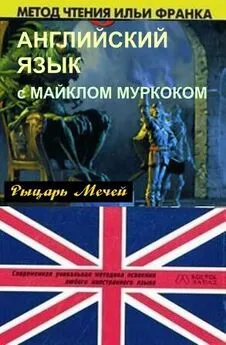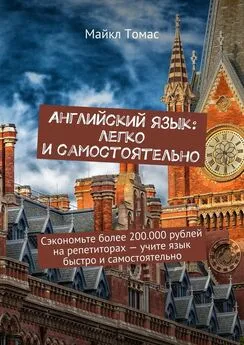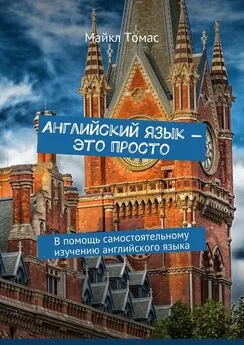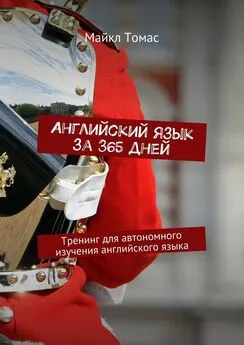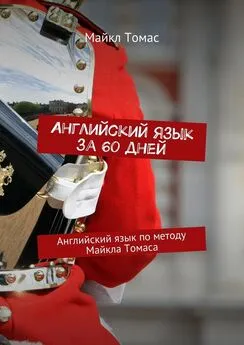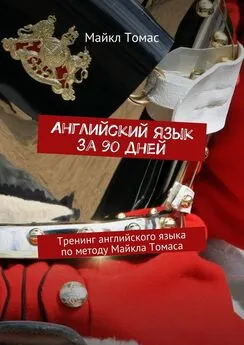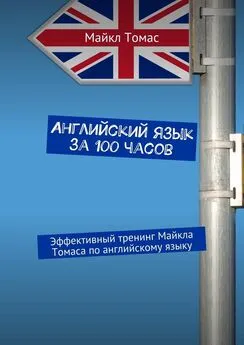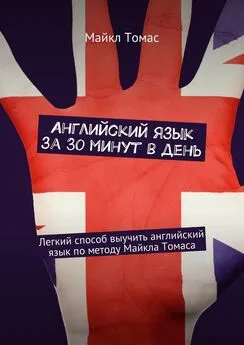Майкл Муркок - Английский язык с М. Муркоком
- Название:Английский язык с М. Муркоком
- Автор:
- Жанр:
- Издательство:неизвестно
- Год:неизвестен
- ISBN:нет данных
- Рейтинг:
- Избранное:Добавить в избранное
-
Отзывы:
-
Ваша оценка:
Майкл Муркок - Английский язык с М. Муркоком краткое содержание
В книге предлагается произведение "Рыцарь Мечей" Майкла Муркока, адаптированные (без упрощения текста оригинала) по методу Ильи Франка. Уникальность метода заключается в том, что запоминание слов и выражений происходит за счет их повторяемости, без заучивания и необходимости использовать словарь. Пособие способствует эффективному освоению языка, может служить дополнением к учебной программе. Предназначено для студентов, для изучающих английский язык самостоятельно, а также для всех интересующихся английской культурой.
Метод чтения Ильи Франка
Английский язык с М. Муркоком - читать онлайн бесплатно полную версию (весь текст целиком)
Интервал:
Закладка:
sighed [saɪd] village [ˈvɪlɪʤ] suspected [səsˈpektɪd] social [ˈsəuʃ (ə) l] variety [vəˈraɪətɪ]
`Aye, Lord. We do it quite often. We punish those who break our laws. We set an example to those who might consider breaking those laws.
Prince Corum sighed.
`Thank you, Mabden. I ride away now.
The red horse trotted off over the moor, leaving the village behind. Now Prince Corum knew that Mabden power had grown greater than any Vadhagh would have suspected. They had a primitively complicated social order, with leaders of different ranks. Permanent settlements of a variety of sizes. The larger part of Bro-an-Vadhagh seemed ruled by a single man — King Lyr-a-Brode. The name meant as much, something like, in their coarsened dialect, King of All the Land.
Corum remembered the rumours (Корум вспомнил слухи). That Vadhagh castles had been taken by these half-beasts (что вадагские замки были захвачены этими полуживотными; to take — брать; захватывать, занимать ). That the Nhadragh Isles had fallen completely to them (что надрагские острова достались им полностью = все были захвачены; to fall — падать; погибать; выпадать /на долю/, доставаться ).
And there were Mabden who devoted their whole lives (были мабдены, которые посвятили свои целые жизни = главным занятием мабденов было) to seeking out members of the older races and destroying them (разыскивание = разыскивать представителей древних рас и уничтожать их). Why (почему)? The older races did not threaten Man (древние расы /ничем/ не угрожали Человеку). What threat could they be (/да и/ какой угрозой они могли быть) to a species so numerous and fierce (для вида столь многочисленного и свирепого)? All that the Vadhagh and the Nhadragh had was knowledge (все, что было у вадагов и надрагов — знания). Was it knowledge that the Mabden feared (было ли это знание, чего мабдены боялись = уж не боялись ли мабдены /этих/ знаний)?
rumours [ˈru:məz] devoted [dɪˈvəutɪd] threaten [ˈƟretn] numerous [ˈnju:m (ə) rəs]
Corum remembered the rumours. That Vadhagh castles had been taken by these half-beasts. That the Nhadragh Isles had fallen completely to them.
And there were Mabden who devoted their whole lives to seeking out members of the older races and destroying them. Why? The older races did not threaten Man. What threat could they be to a species so numerous and fierce? All that the Vadhagh and the Nhadragh had was knowledge. Was it knowledge that the Mabden feared?
For ten days (в течение десяти дней), pausing twice to rest (дважды останавливаясь, чтобы отдохнуть), Prince Corum rode North (Корум скакал на север; to ride ), but now he had a different vision (но теперь у него было другое представление /того/; vision — зрение, вид; представление ) of what Castle Gal would look like (как замок Гал будет выглядеть) when he reached it (когда он доберется до него). But he must go there to make sure (но он должен отправиться туда, чтобы убедиться /в своих догадках/). And he must warn Prince Faguin and his family of their danger (и он должен предупредить принца Фагуина и его семью об опасности), if they still lived (если они еще живы).
The settlements of the Mabden were seen often (поселения мабденов встречались часто; to be seen — наблюдаться, виднеться ) and Prince Corum avoided them (но принц Корум избегал их; to avoid — избегать, сторониться, уклоняться ). Some were of the size of the first he had seen (некоторые были /того же/ размера, что и первое /селение/, /которое/ он видел), but many were larger (но многие были больше), built around grim stone towers (построенные вокруг мрачных каменных башен; to build; grim — жестокий, грозный; мрачный, страшный ). Sometimes he saw bands of warriors riding by (иногда он видел отряды воинов, проезжавших недалеко; band — отряд, группа людей, банда; by — близко, около, рядом ) and only the sharper senses of the Vadhagh (и только более острые чувства вадагов) enabled him to see them before they sighted him (позволяли ему увидеть их раньше, чем они заметят его; to enable — давать возможность, позволять; to sight — заметить, высмотреть ).
warn [wɔ:n] tower [ˈtauə] warrior [ˈwɔrɪə] sighted [ˈsaɪtɪd]
For ten days, pausing twice to rest, Prince Corum rode North, but now he had a different vision of what Castle Gal would look like when he reached it. But he must go there to make sure. And he must warn Prince Faguin and his family of their danger, if they still lived.
The settlements of the Mabden were seen often and Prince Corum avoided them. Some were of the size of the first he had seen, but many were larger, built around grim stone towers. Sometimes he saw bands of warriors riding by and only the sharper senses of the Vadhagh enabled him to see them before they sighted him.
Once, by a huge effort (однажды, с огромным усилием; effort — усилие, попытка; напряжение ), he was forced to move both himself and his horse (он был вынужден переместить себя и своего коня; to force — оказывать давление, вынуждать; both — оба, и тот, и другой ) into the next dimension (в соседнее измерение; next — следующий, соседний ) to avoid confrontation with Mabden (чтобы избежать столкновения с мабденами). He watched them ride past him (он наблюдал, как они проехали мимо него), less than ten feet away (менее, чем в десяти футах), completely unable to observe him (совершенно неспособные заметить его). Like the others he had seen (как /и/ другие, /которых/ он видел /раньше/), these did not ride horses (эти не ездили верхом на лошадях), but had chariots drawn by shaggy ponies (а имели колесницы = передвигались в колесницах, запряженных косматыми пони; to draw — тащить, волочить; тянуть ).
As Corum saw their faces (когда Корум увидел их лица), pocked with disease (испещренные оспинами от болезни; pock — оспина; выбоина, щербина; to pock — покрываться оспинами, становиться рябым ), thick with grease and filth (густо покрытые жиром и грязью), their bodies strung with barbaric ornament (их тела, обвешанные варварскими украшениями; to string — завязывать, шнуровать; вешать /гирлянду/; нанизывать /бусы/ ), he wondered at their powers of destruction (он удивился их разрушительным силам). It was still hard to believe (до сих пор было трудно поверить) that such insensitive beasts as these (что такие нечувствительные животные, как эти), who appeared to have no second sight at all (у которых, оказалось, нет второго зрения/способности к ясновидению вообще; to appear — показываться, появляться; оказаться; second sight — ясновидение ), could bring to ruin the great castles of the Vadhagh (сумели разрушить великие замки вадагов; to bring to ruin — разрушить, погубить, довести до краха ).
huge [hju:ʤ] disease [dɪˈzi:z] grease [ɡri:s] ornament [ˈɔ:nəmənt] insensitive [ɪnˈsensɪtɪv]
Once, by a huge effort, he was forced to move both himself and his horse into the next dimension to avoid confrontation with Mabden. He watched them ride past him, less than ten feet away, completely unable to observe him. Like the others he had seen, these did not ride horses, but had chariots drawn by shaggy ponies.
As Corum saw their faces, pocked with disease, thick with grease and filth, their bodies strung with barbaric ornament, he wondered at their powers of destruction. It was still hard to believe that such insensitive beasts as these, who appeared to have no second sight at all, could bring to ruin the great castles of the Vadhagh.
And at last the Prince in the Scarlet Robe reached the bottom of the hill (наконец, Принц в Алом Плаще достиг подножия холма; bottom — нижняя часть, дно, подножие, основание ) on which Castle Gal stood (на котором замок Гал стоял; to stand ) and saw the black smoke billowing (увидел, как поднимался черный дым; to billow — вздыматься; волноваться ) and the red flames leaping (и как прыгали красные /языки/ пламени; flame — пламя, огонь; to leap — прыгать, скакать; резко меняться ) and knew from what fresh destruction the Mabden beasts had been riding (и понял, от какого нового разрушения ехали = откуда возвращались /встреченные/ мабденские твари; fresh — свежий, новый ). But here there had been a much longer siege (но здесь происходила более длительная осада), by the look of it (/судя/ по всему; look — взгляд; вид, внешность ). A battle had raged here that had lasted many days (битва, /которая/ кипела здесь, длилась много дней; to rage — бушевать /о буре, эпидемии и т. д. /, буйствовать ). The Vadhagh had been more prepared at Castle Gal (вадаги в замке Гал были более подготовленными; to prepare — готовить /обед, лекарство/; подготавливаться ). Hoping that he would find some wounded kinsmen whom he could help (надеясь, что найдет каких-нибудь раненых родственников, которым сможет помочь), Corum urged his horse to gallop up the hill (Корум погнал коня галопом вверх /по склону/ холма; to urge — подгонять, подстегивать ).
Читать дальшеИнтервал:
Закладка:
